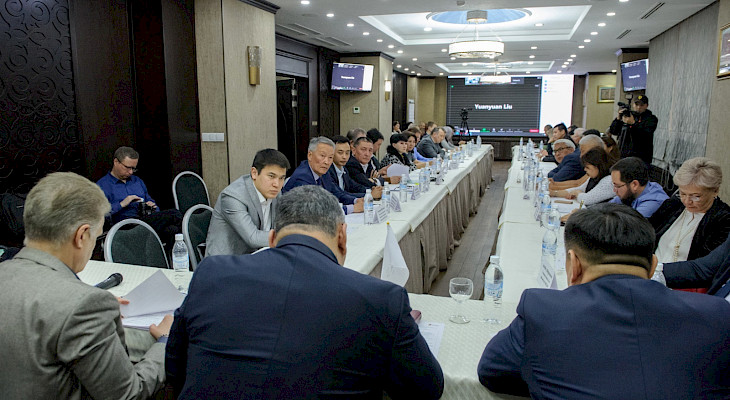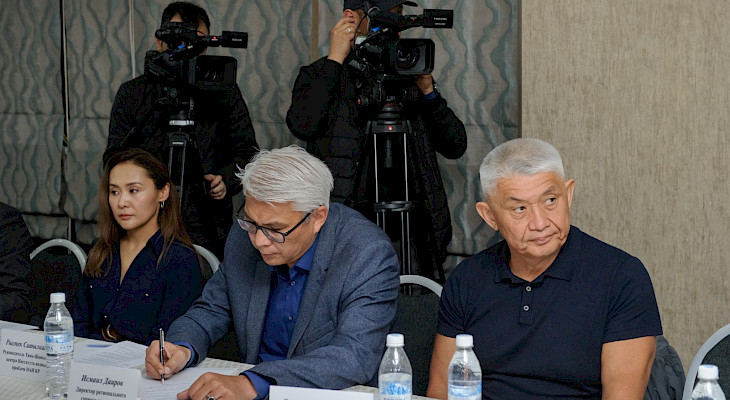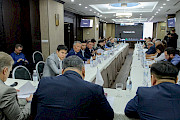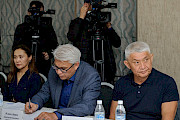Continuation
Director of the Institute of Water Problems and Hydropower of the National Academy of Sciences of Kyrgyzstan, Professor, Doctor of Technical Sciences Dogdurbek Chontoyev drew special attention to the lack of economic principles in interstate water use.
"By introducing fees for water supply services for their own (internal) water users, the Central Asian states completely ignore the market mechanism for payment for water obtained from the territory of neighboring states. They continue to use it for free, without reimbursing Kyrgyzstan for any expenses for servicing and operating reservoirs and other interstate irrigation structures regulating river flow and supplying water to neighboring states, i.e. these objects are serviced and maintained solely at the expense of the budgets of the republics," explained the speaker.
At the same time, he emphasized that all water regulating and transporting structures, built more than half a century ago, are now in a dangerous technical condition and pose a real threat of collapse, which threatens catastrophe, primarily to the plain states located downstream - Uzbekistan and Kazakhstan.
"Only together, with the proportional participation of all states, can reliable operation of interstate hydrotechnical facilities be ensured, and therefore, guaranteed water supply," explained D. Chontoyev.
Conference participants also noted that today there is active interest in the water issues of the region from global power centers. The difficulties encountered in solving water problems, combined with the fact that the Kushka Canal in Afghanistan adds additional strain to the regional water management system, make the issue of international arbitration particularly relevant.
"Water plays a key role economically, but this factor is also crucial in matters of regional security. The same question of the impact of the Afghan Kushka Canal on water use in Central Asia has several contexts.
For example, the construction of the canal is related to geopolitical processes and demonstrates the presence of external players in the water agenda of Central Asia, primarily the United States, which funded the construction of this water canal through USAID, without considering the interests of Turkmenistan and Uzbekistan.
As Uzbekistan's President Sh. Mirziyoyev noted, with the launch of this facility, the water regime and balance in Central Asia can fundamentally change. However, Washington showed absolutely no interest in how this project would affect the countries of Central Asia and what damage it would do to their national interests," reminded Igor Shestakov, Director of CEI "Oy Ordo."
This idea was supported by the Deputy Head of the Department of Political Science and Political Philosophy of the Diplomatic Academy of the Ministry of Foreign Affairs of Russia, PhD Sergey Zhiltsov. He noted that the efforts of Central Asian countries to negotiate on water issues are being made against the backdrop of deteriorating water resource situations and active Afghan policies.
"The implementation of the project, which is planned to be completed by 2028, began in March 2022. The canal is supposed to be 285 km long, 100 meters wide, and 8.5 meters deep. After the completion of the construction, water consumption from the Amu Darya to Afghanistan may increase from 7 to 17 cubic kilometers. This will be particularly problematic for Turkmenistan and Uzbekistan, which are located downstream of one of the region's major water arteries. Moreover, ecologists believe that the construction of the canal could lead to climate change and an ecological disaster," the expert explained.
He emphasized that Afghanistan, in pursuing its water policy, acts without consultations with other countries in the region, which raises the question of who benefits from the construction of this canal in the first place.
"According to Afghan sources, the cost of the project is $684 million. The Taliban claims that the canal construction is funded from its own funds. However, considering the difficult economic situation in the country, this seems unlikely. Moreover, the canal construction project was developed with the assistance of USAID, which also stands behind the research conducted by AACS Consulting within the framework of the project 'Strengthening Watershed and Irrigation Management' (SWIM), managed by AECOM International Development, Inc./DT Global," the speaker said.
He noted that Central Asian countries have limited leverage on Afghanistan. Meanwhile, the Afghan side understands that the construction of the canal will not only create opportunities for obtaining additional volumes of water resources.
The country will gain a powerful lever of influence on neighboring states, which will exacerbate the geopolitical situation in the region and introduce additional tension.
"Water issues confidently occupy the first place among the problems that will affect the development of Central Asia. At the same time, the policy of non-regional actors practically provokes the preservation of complex interstate relations between Central Asian countries," added S. Zhiltsov.
Concerns about the construction of the Kushka Canal in Afghanistan were also supported by the Director of the International Research Center "Water Hub" (Kazakhstan), Professor, Doctor of Technical Sciences Anatoly Ryabtsev.
"Afghanistan claims a very serious share, within 10-12% of the total flow of the Amu Darya. This is a serious problem that will greatly affect Turkmenistan and Uzbekistan, located at the mouth of one of the region's main water arteries.
Therefore, it is important for Afghanistan to join the Interstate Coordination Water Commission of Central Asia. We once invited them, but frequent changes of power in this country prevented Afghanistan from becoming a full member of this community," noted the speaker.
He particularly emphasized the need to jointly work on preserving and rational use of water resources, as well as energy potential:
"We have started work on creating a water-energy consortium, which should provide heads of Central Asian countries and governments with a mechanism for managing and obtaining benefits, both from the energy side and from irrigation. If we do this separately, nothing good will come of it," added A. Ryabtsev.
Source: CEI "Oy Ordo"
CentralasianLIGHT.org
May 7, 2024




